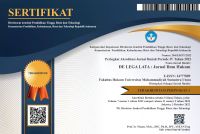The Four Main Principles That Become the Pillars of Legal Building National Treaty
Abstract
Contract law as regulated in Book III of the Criminal Code. Civil Code is a legacy of the Dutch Colonial which is more than a century and a half old. Considering the development of the business world which is closely related to the law of agreement or contract, it becomes a sine qua non to reform the law of agreement. The renewal of treaty law cannot be separated from the search for legal principles that serve as the basic foundation so that legal issues arise to seek and find the legal principles that are the pillars of the building of national treaty law. This research is a normative juridical research, namely research that conducts an assessment of library materials. The data source used is secondary data. Secondary data is data sourced from library research related to publications, namely library data listed in official documents. The search and discovery of these legal principles is carried out through normative legal studies by relying on the search for various theoretical legal materials obtained from literature studies. The results of the study found four main legal principles as the main pillars of the building of national contract law, namely the principle of consensualism, the principle of freedom of contract, the principle of binding contractual power and the principle of good faith
Keywords
Full Text:
PDFReferences
Adolf, H. (2020). Hukum Transaksi Bisnis Transnasional. Keni Media.
Anderson, Fox, T. (1984). Business Law. South-Western Publishing Co.
Asmadi, Erwin, Padian Adi Selamat,Benito Asdhie Kodiyat, MS, Ismail Koto, "Efektivitas Pemanfaatan Teknologi Informasi Dalam Persidangan Perkara Pidana Selama Pandemi Covid-19 ", De Lega Lata: Jurnal Ilmu Hukum, Vol. 6 No. 2 Tahun 2021.
Badrulzaman, Mariam Darus. (1987). Sistem Hukum Perdata Nasional. Medan.
_______________________. (n.d.). Menuju Hukum Perikatan Indonesia. Medan: Fakultas Hukum USU.
_______________________. (1983). KUHPerdata Buku III: Hukum Perikatan Dengan Penjelasan. Alumni.
_______________________. (1997). Mencari Sistem Hukum Benda Nasional. Alumni.
_______________________. (2018). Hukum Harta Kekayaan Indonesia Didalam Perkembangan. Citra Aditya Bakti.
GW. Paton. (1964). A Textbook of Jurisprudence. Oxfort University Press.
Hasan, Madjedi. (2005). Pacta Sunt Servanda: Penerapan Asas Janji itu Mengikat Dalam Kontrak Bagi Hasil di Bidang Minyak dan Gas Bumi. Fikahati Aneska.
Satrio, J. (1992). Hukum Perjanjian. PT. Citra Aditya Bakti.
Kusumohamidjojo, Budiono. (2017). Perancangan Dan Legalitas Kontrak. Mandar Maju.
Lubis, Taufik Hidayat, Ismail Koto, "Diskursus Kebenaran Berita Berdasarkan Undang-Undang Nomor 40 Tahun 1999 Tentang Pers Dan Kode Etik Jurnalistik", De Lega Lata: Jurnal Ilmu Hukum, Vol. 5 No. 2 Tahun 2020.
Moch. Isnaeni. (2017). Selintas Pintas Hukum Perikatan (Bagian Umum). Revka Petra Media.
Ridwan Khairandy. (2015). Kebebasan Berkontrak & Pacta Sunt Servanda Versus Iktikad Baik: Sikap Yang Harus Diambil Pengadilan. Yogyakarta: FH UII Press.
Subekti. (1975). Pembinaan Hukum Nasional. Alumni.
______. (1976). Aspek-Aspek Hukum Perikatan Nasional. Alumni
______. (2010). Hukum Perjanjian. Intermasa
DOI: https://doi.org/10.30596/dll.v7i2.10288
Refbacks
- There are currently no refbacks.
Address:
Faculty of Law, University of Muhammadiyah Sumatera Utara Jl. Kapten Mukhtar Basri No. 3 Medan, Kode Pos 20238
E-mail: delegalata@umsu.ac.id
Telp/HP/WA : 081262664567
DE LEGA LATA: Jurnal Ilmu Hukum is abstracting & indexing in the following databases:
De Lega Lata: Jurnal Ilmu Hukum is licensed under a Creative Commons Attribution-ShareAlike 4.0 International License.
Statcounter









